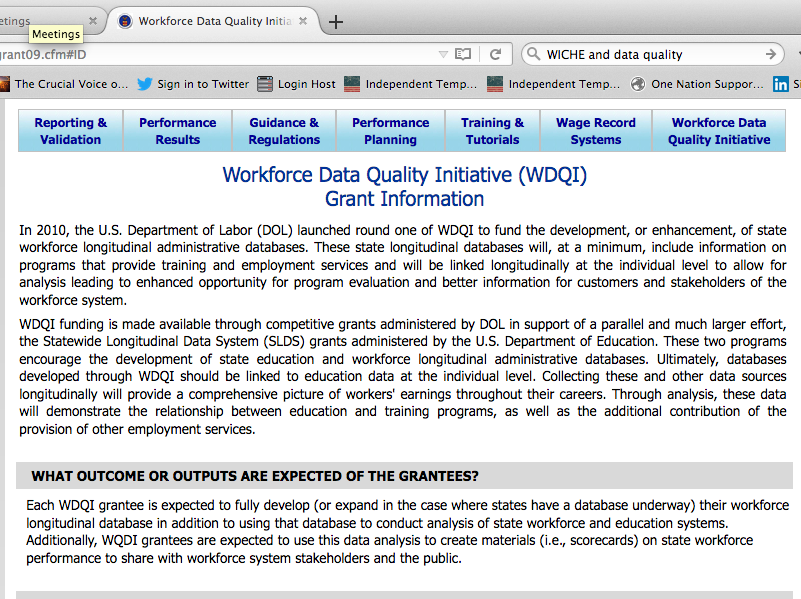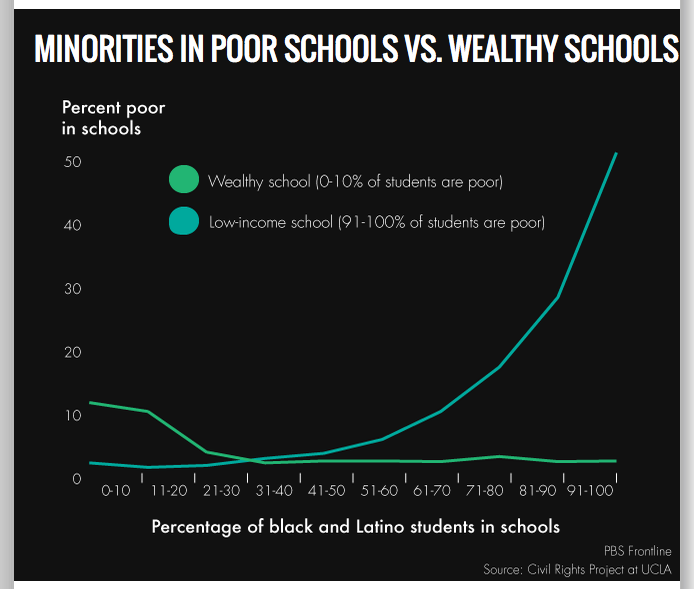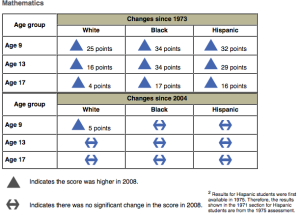Education reform leaders like Bill Gates have disrupted our public schools without considering how their plans disturb the education of children and upset the lives of families. Repeatedly, political and philanthropic leaders force change on our schools without any meaningful open exchange of ideas with parents and educators.
They are in control of education policy. Education policy controls how our public dollars are spent. How our money is spent does matter. Policy — coming down from above — matters. The education reform oligarchs driving their agenda into our laws are the ones ultimately governing our schools.
So it behooves us to look closer at Mr. Bill Gates’ perspective.
Bill Gates’ Views On Public Education Compared To My Perspective — As Just A Parent

The video was removed. A similar statement was made in another interview. ““The bulk of the money by far will always come from government.”
Mr. Gates…
From what Mr. Gates said, he sees the philanthropic role as being “to shake things up” and fund pilot programs. He says he sees philanthropy as having a “super-narrow role” because the reality is that the public is footing most of the costs.
But what Gates sees as a primary role for philanthropists I saw, beginning in the mid to late 90’s, as a primary problem.
No one had clarified the concept of what exactly a “pilot program” meant.
In this case, the use of the word “pilot” means that children serve as a “trial unit for experimentation.” … The big question becomes: how many were set up for future failures because of pilots gone wrong? From Education’s Missing Ingredient: What Parents Can Tell Educators
The people piloting failed programs didn’t send in cleanup crews. There were no “Super Fund Site” signs going up at my neighborhood schools. But if a person thinks that little learning is actually going on in schools before they step in, they might consider any harm done as insignificant. That may be the case with Mr. Gates.
“K to 12 is partly about babysitting the kids so the parents can do other things.” Source: The Hill, 2010
Wow! Really!?! And I thought that educated mothers around the world wanted their children to get a good education. I believe that is the major reason parents send children to school.
Parents want their children to enter classrooms where the teachers are happy about doing their job and they are enabled to do it well. … Parents want to have a say in how and what their child is taught. From The Crucial Voice of the People: Education’s Missing Ingredient, 2nd edition
So how do we view the school improvement problem?
Bill Gates believes “The key problem is political will.”
What I believe can’t be so simply stated. I believe in “the political principle” as an ideal that politics has failed at miserably.
The political principle is the belief that when decisions are made affecting you or your possessions, you should have a role, a voice in the process of that decision-making. …
And time and again, politics has proven itself to be an irresponsible driver of educational progress.
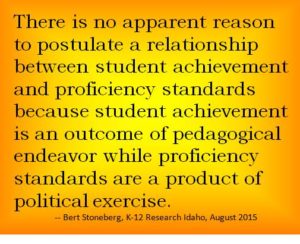
That quote is based on statistical analysis of the rigor of standards and their lack of correlation to student achievement.
And while standards-driven, outcome-based education reform was not Bill Gates’ brainchild, he has become the political and financial driver of the movement. He believes “that stronger standards will help more students live up to their potential.”
For decades, the faith in setting standards as a reform is what politicians and much of the nation agreed to spend education reform dollars on — “ever – higher” standards and the tests to determine achievement outcomes. On this topic, I believe in the historical evidence uncovered through my own research and the facts provided by people a whole lot smarter than I.

Source: The National Academies
But ignoring all that, federal and state policies cemented the idea that standards are the necessary first step in education reform without considering the historical and statistical evidence demonstrating that the standards/outcome-based theory is incorrect.
So when did Bill Gates jump into the education reform arena? Exactly? Well, that’s hard to pin down but what is important to know is that by 2006, Mr. Gates had become the most influential person in education reform policy in America.
What probably matters more is who influenced the influencer?
Here’s a brief look at a few major players…
- 1986 National Governors Association (NGA) meeting, Chaired by then Governor Lamar Alexander, Marc Tucker (from Carnegie Forum on Education and the Economy) made his case for “the necessary revolution in school policy” (p82)
- 1989 Marc Tucker (National Center on Education and the Economy – NCEE) reached out to President H. W. Bush promoting the restructuring of schools, setting of national goals, and focusing on workforce training “To Secure Our Future: The Federal Role in Education.”
- 1990 Tucker’s NCEE publication “America’s Choice” continued the push for benchmarked standards in order for the U.S.A. to remain competitive in the global economy. Marc Tucker clearly urged leaders to focus on output measures at the Task Force on Education Workshop chaired by then Governor Bill Clinton (Tucker minute 33:30).
- 1992 Marc Tucker penned his infamous “Dear Hillary Letter” that became part of Congressional Record (p353) submitted by Representative Bob Schaffer in 1998. (Here is an easier to read copy.)
With political figures — including Bill and Hillary Clinton — on board with the Outcome-Based Education Reform Movement and then Secretary of Education Lamar Alexander cheering the first federal funding earmarked for World Class Standards/Academic Achievement Tests (p93), the federal role in education expanded.
- 1996 The Education Summit brought together governors and business with education and community leaders. Their mission: To start a national effort to establish high academic standards, assessments, accountability and improve the use of school technology as a tool to reach high standards. As the story goes, this meeting gave birth to Achieve, Inc.
- 1997 Lamar Alexander & Bill Gates address the NGA Lamar Alexander mused about how it could be that, after all the years of trying, with the governors “leading the charge” and pouring money into “their plan,” charters and standards had not improved education. Alexander’s answer: “We have been too timid.”
- Bill Gates talked about “digital nervous systems” able to improve the quality and efficiency of public services and provide citizens with access to more knowledge in the “Information Age.”
Bill Gates Steps In — Officially
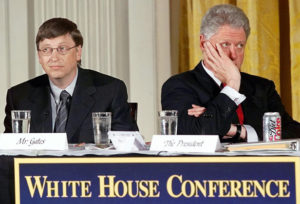 1999 Gates co-founds the Bill and Melinda Gates Foundation. Among many other things, they provided funding for Achieve, Inc.
1999 Gates co-founds the Bill and Melinda Gates Foundation. Among many other things, they provided funding for Achieve, Inc.
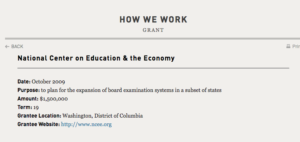 The Gates Foundation became a continuing financial supporter of Marc Tucker’s projects at NCEE.
The Gates Foundation became a continuing financial supporter of Marc Tucker’s projects at NCEE.
2001 — President George W. Bush signed No Child Left Behind into law.
2005 Bill Gates co-chaired the National Education Summit on High Schools. Gates emphasized — there is crisis— our schools are obsolete—and a new design is required.
Influence & The Gates Foundation Agenda
One author put it this way…
The Gates agenda is an intellectual cousin of the Bush Administration’s 2002 No Child Left Behind law.
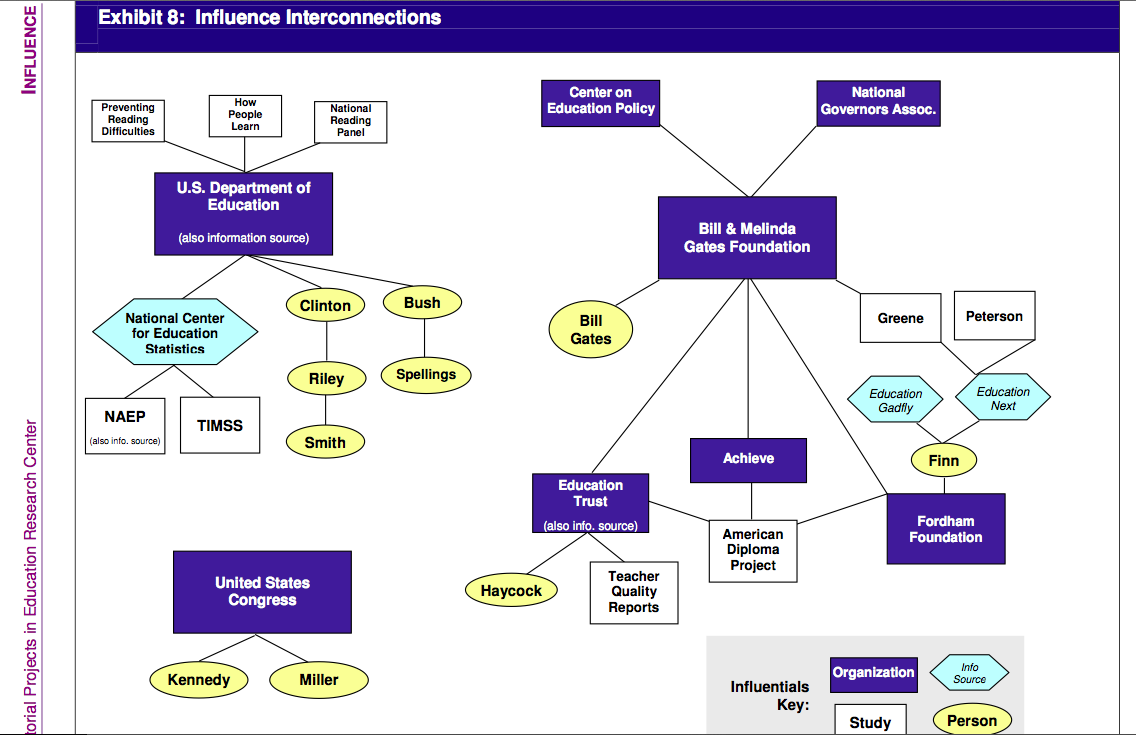
In 2006, with Bill Gates viewed as more influential in education policy that President Bush, the only two government institutions on equal footing with the Gates Foundation were the U.S. Department of Education and Congress…..NOW?
Some players have changed. Who governs is the question.
For Gates to amplify his philanthropic influence, all he needed to do was gain control of Congress and the U.S. Department of Education. … With Marc Tucker as one collaborator, education leaders were trained and placed in the U.S. and many State Departments of Education.
Influencing Congress? It only requires the multiplication of think tanks, organizations and their lobbying efforts.
Now, if you look back at the video clip at the top of this blog (minute 3:18), Mr. Gates chuckles about philanthropy being “so big we could take” over.
- 2006 The Data Quality Campaign Launched at the Data Summit — supported by the Bill & Melinda Gates Foundation. The campaign promoted their “ten essential elements” of a longitudinal data system, which included the ability to match student records between the Pre-K and post-secondary systems.
- 2009 Bill Gates explained at the National Conference of State Legislatures that a thorough data collection system is the best way to track student success. And people, like Parkway, Ohio school board member, Ryan Thompson believe…
“It would be very hard to identify a particular student.”
You be the judge. The following screen shots come directly from documents about data collection and sharing pilot programs put in place simultaneously with Common Core Standards. 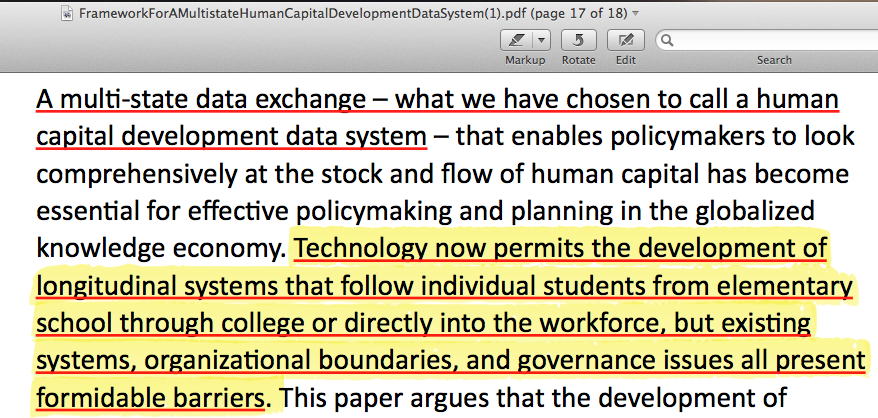

SOURCE Department of Labor: It clearly states (middle of 2nd paragraph), “Ultimately, databases developed through WDQI should be linked to education data at the individual level.”
The years between 2009 and 2014, the Common Core years, created murky waters in the swamp.
Exactly when and how the Workforce Data Quality Initiative (WDQI) arose is probably a story for another time. What is important to know is that real concerns exist for all citizens, particularly for parents wanting to protect their children’s data.
Is the Department of Education addressing parent concerns? How about Congress?
The bill before Congress known as the “Foundations for Evidence-Based Policymaking” (FEPA, H.R.4174) was pushed through the House without debate. The foundation it puts in place is a mega federal database without mention of education data — but that is the plan. Next up will be the College Transparency Act (CTA) which overturns the ban on a federal student record system.
This is the Gates agenda. But go back and read the Dear Hillary Letter. This is the Marc Tucker plan. Is this America’s choice?
“It is not unfair to say that the Gates Foundation’s agenda has become the country’s agenda in education.” Michael Petrilli
To date, leaders have brushed citizen concerns aside and done what they want. That leaves me wondering; is it too late to regain control of schools through civil disobedience? Will that work against an oligarchy?
One thing is certain; our representatives are driving policy while under the influence.

